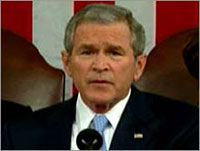Bush budget seeks more billions on war in Iraq
President Bush will send Congress a $2.9 trillion spending request Monday that seeks billions of dollars more to fight the Iraq war and tries to restrain the spiraling cost of the government's big health care programs.

Responding to the new political realities of a Democratic-controlled Congress, Bush will propose balancing the budget in five years, matching a goal put forward by Democratic leaders. But Bush would achieve that feat while protecting his cherished first-term tax cuts.
The arrival of the massive four-volume set of green budget books, which will cover the budget year that begins next Oct. 1, will be followed by months of debate in Congress. Democrats charged that Bush wants to make painful cuts across a wide swath of government programs while protecting tax cuts that will make the deficit worse after 2012.
"This budget is plunging us toward a cliff that will take us right into a chasm of debt," Senate Budget Committee Chairman Kent Conrad, D-N.D., said in an interview Sunday.
"In real terms, Bush's plan is going to have very substantial cuts by the fifth year of this budget in all of the domestic priorities from education and health care to law enforcement and veterans," Conrad said. "With Democrats in control, we will have different priorities."
The federal deficit hit an all-time high under Bush of $413 billion in 2004. It has been declining since that time and the 2008 budget projects it will continue to decline and show a surplus in 2012, three years after Bush leaves office.
To accomplish those reductions, Bush would allow only modest growth in the government programs outside of defense and homeland security. He is proposing eliminations or sharp reductions in 141 government programs, for a savings over five years of $12 billion, although Congress has rejected many of the same proposals over the past two years.
Bush also will seek to trim spending on farm subsidies by $18 billion over five years, mainly by reducing payments to wealthier farmers, an effort certain to spark resistance among farm state lawmakers.
Bush's budget would achieve nearly $100 billion in savings over five years by trimming increases in Medicare, the health insurance program for 43 million retirees and disabled, and Medicaid which provides health care to the poor, the AP reports.
Democrats blasted those proposals, noting that the Republican-controlled Congress last year did not approve much smaller reductions in federal health-care spending.
"Rather than trying to solve our health care crisis by lowering costs and covering more people, the President's plan will make the crisis worse by raising costs and failing to cover those who need it most -- our nation's children," Sen. Edward M. Kennedy (D-Mass.) said yesterday in a statement.
Democrats also pointed to an assumption common to projections by the CBO and White House: Both assumethatthe alternative minimum tax will be permitted to expand to millions of additional families, generating billions in additional tax dollars by 2012. Democrats and some Republicans have vowed to halt the growth of the tax and, ultimately, repeal it.
Portman said the White House proposal is a "tight budget, but a more realistic budget" that contains much to appeal to Democrats, such as a small increase in non-security domestic spending, the first in two years, the Washington Post reports.
Some defense budget experts charge that the military is in a crisis of its own making. Although critics acknowledge that the armed forces faced a nearly decade-long "procurement holiday" at the end of the Cold War, they argue that the services chose to replace aging, overused weaponry with highly sophisticated, complicated armaments that in some cases cost three times the systems they replaced.
By attempting to take huge technological leaps instead of incremental improvements, these critics argue, the replacement weapons face years of delays and vast cost increases, forcing the Pentagon to buy fewer of each weapon.
"They have demonstrated that they have absolutely no discipline in dealing with the money they've gotten, and their only response when they get more money is to ask for still more money," said Winslow Wheeler, a former defense budget staffer in the Senate who now works for the nonpartisan Center for Defense Information.
According to an October study by the Congressional Budget Office, the Pentagon may need as much as $560 billion every year -- or $80 billion more than the administration is proposing in the non-war portion of its 2008 budget -- just to pay for all the weapons on order and to meet growing personnel and operational costs.
The services insist that they are working to drive down such delays and cost spirals, but defend the need to push the technological envelope.
"When you actually have to put someone in an airplane and send them into combat, do you want to win this ballgame by one run in the bottom of the 9th, or do want to have the game called in the 7th inning by 20 runs?" asked Moseley.
Despite occasionally intense inter-service rivalries, all three chiefs insist that, despite their individual needs, they are not arguing for a shift in resources from one branch to the other. Instead, each has said he will be pushing for a bigger pie overall.
Defense budget experts said that any decision by Congress to examine greater increases in defense spending could evolve into a defining discussion over U.S. foreign policy goals and the Pentagon's vision of its armed services in a post-Cold War world, the Los Angeles Times reports.
Source: AP
Prepared by Alexander Timoshik
Pravda.ru
Subscribe to Pravda.Ru Telegram channel, Facebook, RSS!


